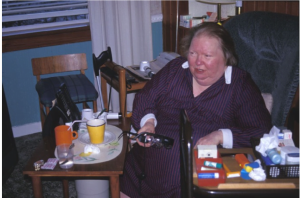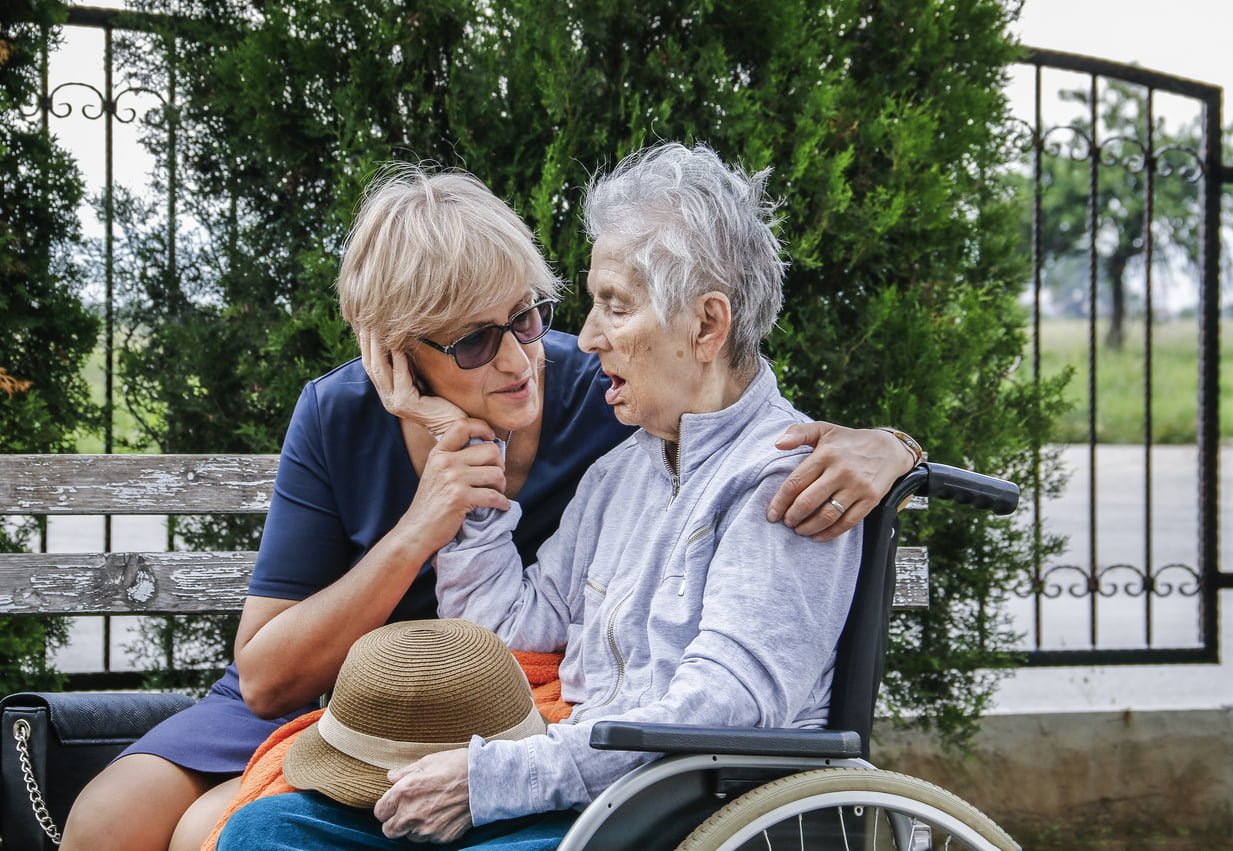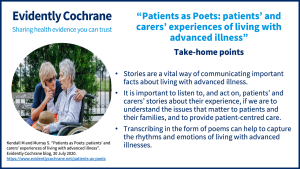Qualitative researchers Marilyn Kendall and Scott Murray have in the last 20 years interviewed many patient groups dying with cancer, organ failure of lungs, heart, or liver, strokes and frailty. They all tell vivid narratives. In this blog, they reflect on the importance of these accounts for getting to the heart of what matters to people and share some ‘found’ poems that have emerged from their stories.
Page last checked 26 June 2023.
Take-home points
The voices of patients and family carers can be lost in busy wards, crowded clinics and late-running GP practices, and also in research studies, unless there is time for careful listening to their accounts of their illness experience. Yet these accounts are vital if we are to get to the heart of what matters to people, and thus be able to provide patient-centred care.
Qualitative research has shown its value in this regard, yet even here these accounts can become fragmented and decontextualized, as interview transcripts are broken up into separate quotations to fit within research aims and questions pre-defined by clinicians and researchers.
Stories are no longer unexpected in illness accounts. Patients often clearly feel that they can explain things best via a story, and even in a busy surgery will preface their accounts with, “Well, Doctor, so as you can understand, what happened was …” At the same time a growing interest in narrative, across many disciplines, has focused attention on storytelling as a universal human activity and never more so than at difficult times in our lives, such as when we are ill.

Photo credit: Scott Murray, with permission from this research participant.
Consequently, our research group wanted to look again at our interview transcripts and consider ways to honour their storied form, and what this can teach us about the experience of serious illness. This led us to experiment with transcribing the interview recordings into a poetic form, rather than into blocks of prose. Work in linguistics has suggested that human thought may naturally fall into patterns of verses, and by carefully listening to the stresses on words and the breathing patterns in the interview stories we did indeed find them falling into the rhythms and cadences of natural or “found” poetry. Looking at patient’s and carer’s accounts in this way opened up new insights into their experiences and concerns, and sensitised us to aspects of it that we might otherwise have missed, or misunderstood.
We have since used these poems as teaching aids with medical and nursing students and other health care professionals. Many found them invaluable in bringing patient experiences to life, and in sensitising them in future consultations to the complexities, nuances, cadences, and emotional toll of patients’ and carers’ experiences of living with serious illness. When we shared the poems with the research participants, they were delighted with them, feeling them to be a strong, and accurate depiction of their experience. “Yes, that’s how it was all right,” one said.
Research has consistently shown that patients and family carers value healthcare professionals who, despite being busy, make time to listen to, and learn from, their experiences. Transcribing research interviews into this “found” poetry form may be one way to do this, and to find again the voices of experience that were in danger of being lost.
Patients as poets: two ‘found’ poems
These two poetic extracts come from a studyAn investigation of a healthcare problem. There are different types of studies used to answer research questions, for example randomised controlled trials or observational studies. of the experiences of people dying from heart failure or lung cancer and a more recent study of the experiences of people with stroke.
Mrs N – “If you were a horse…”: a carer’s story
Well, he’s the same again,
Started, you know,
The swelling up.
And the doctor
Didn’t put off,
Any time,
This time.
She said,
It was much better,
Just to get him in.
So he went in,
At the beginning of December
And he actually had been having,
Some rather strange turns.
Very dizzy turns.
It just seemed to be
Something that
Came over him.
And it’s one
Of the tablets,
That he has
For his asthma,
Which they say
Is a very
Dangerous drug.
He’s been on it
For many years,
And it’s affecting
His heart,
And they are trying
To stop it
But they can’t
Stop it
Because
He can’t breathe
Without it.
The hospital doctor said,
The last time we were in,
That it had
To be stopped,
And we did try
To stop it
And I had to phone
Our own doctor
Because he was struggling
And she came in
And she said to him,
“Which would you rather have,
You know,
The heart out of rhythm,
Or not able to breathe?”
He said,
“Well,
If I’m going to die,
I’d rather die
With my heart stopping
Than gasping
For breath.”
Well anyway,
They took him in
And he was hooked up to things
And couldn’t get
Moving around
At all,
But they decided
They were going
To let him home
For Christmas.
And he had
Christmas Day
And he took ill
The next day
And he has not really
Picked up
Very well
Since then
I got the doctor in
And I was quite disappointed
Actually
At the lack of support
And even the nurse
Agreed with me
When she came in
For his blood.
I said,
“I feel
I’ve just been left
With it
I just don’t know
What we’re going to do
With him really.
Do you have a gun
In your bag?
He probably needs
A gun!
And his circulation
Of course
Isn’t good
And that
Doesn’t help.
In fact
If you were a horse
They would shoot you.
Things feel out of control: a daughter’s experience
Transcript:
I think it’s quite humbling
When you realise that
It doesn’t matter how old
Your mother is
She’s still your mother.
When that happens
It is quite a shock,
It is doubly a shock.
I suppose then you think
Well because she’s 86
Are the NHS going to really try
As they might
To keep her hale and hearty?
The stress from the stroke
I think really has to be
Two-fold.
First of all
Supporting her
And not encouraging her
To be anxious
About anything
Because it’s all a bit rubbish just now,
But we’re trying to get things
Better for you.
And also supporting her sister
Because they’ve lived together
Virtually all of their lives.
So whilst there’s no kind of
She doesn’t have a spouse any more,
My father died in ‘96
There is someone there
That I do need to support as well.
So in amongst all that
I’m having to do stuff at home
And I’m having to keep going to work,
And I’m not giving anything
As much of the attention as I should do
So I think I’m being stretched
Across many different things,
And I really don’t like that because
I’m a bit more used
To being in control.
Marilyn Kendall and Scott Murray have nothing to disclose.





These are just beautiful poem/stories. I am grateful to have read/heard them. I wish I had done a carer interview after my dad died of dementia and the various ailments in 2016. It was a profound time. I remember of course, many intense parts of stories, but it is the in-between things that drift away without foresight to have recorded them in some way.